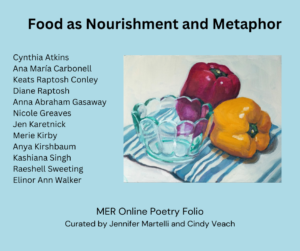 Curated by Jennifer Martelli and Cindy Veach
Curated by Jennifer Martelli and Cindy Veach
In her poem, “I will hunger,” Elinor Ann Walker states “All paths lead toward hunger,” and that
The maw is the mother, her
mouth, the oven, the hope
that appetite leaves you,
gaping, wild, sated.
The poems in the September folio examine food in all its aspects: how it evokes memory and history; how it transforms the body and landscapes; how its absence leaves us wanting.
In “Tapestry,” Cynthia Atkins’ speaker recollects herself as a teen with Carole King’s famous album, and asks
Who knew when I sat cross-legged
on the floor eating a bowl of cottage cheese,
resting the album jacket
in the V of my legs—that her words
could last lifetimes…?
Nicole Greaves also employs food to describe bodies in flux in “Scars,” when she writes, “We are here with each other in girlhood again, the cedar/smell, the forests at camp, the sweat like chicken in the oven.” The act of feeding, that most intimate expression of motherhood and community, is illustrated in Kashiana Singh’s “How to destroy a sunny side up, like an 8-month-old” when she describes her son’s “index finger put//inside the blob, finger plopped into mouth…”
Food is also part of one’s origin story. In her mother-daughter epistolary poem, “Your mother, whose name I could never pronounce,” Keats Conley writes, “Today we killed the rooster and as we boiled/his bones, I thought of grandmother…” In response, Diane Conley Raptosh, Keats Raptosh Conley’s mother, writes, “Let’s wand/Let’s witch/Let rooster bones stew…” Jen Karetnick tells an immigration story, a story of journey, in “Babka,” that “Matriarchal fertility cake named for grandmothers . . .” This rich, sweet cake becomes a symbol for persistence, labor, making-do, “the investment for the week’s end . . .”
Food, or the lack of it, shapes the landscapes in these poems as well. Merie Kirby describes an emotional hunger in “The witch I have become” when she tells us, “If the walls of my house were gingerbread/I would have eaten them myself long ago.” In “The Kenmore Refrigerator,” Anna Abraham Gastaway describes this “cheapest version” as “filthy with ghosts of salad-dressing past . . . weird smelling rot at the back.” The rocky landscape in Ana Maria Carbonell’s “El Laguito” become “skirt steaks we always ate/because they were so cheap . . .”
These poems risk hunger. Anya Kirshbaum asks,
What comes of bounty unreceived? Will it seep
like honey back to the underworld? Is the earth underfoot
drunk on pear wine?
These poems are vulnerable, willing to offer their emotional cores to us, as nourishment, as we “lean forward/with an eager mouth.” As Raeshell Sweeting says so simply, “And I feed you.”
We hope you are as sated by this folio as we were.
Jennifer Martelli and Cindy Veach
(Click on each poet’s name to read the poems!).
Featured Poets:
Cynthia Atkins
Ana María Carbonell
Keats Raptosh Conley
Diane Raptosh
Anna Abraham Gasaway
Nicole Greaves
Jen Karetnick
Merie Kirby
Anya Kirshbaum
Kashiana Singh
Raeshell Sweeting
Elinor Ann Walker
Image: “Two Peppers” by Suzanne Altman. www.suealtmanart.com
